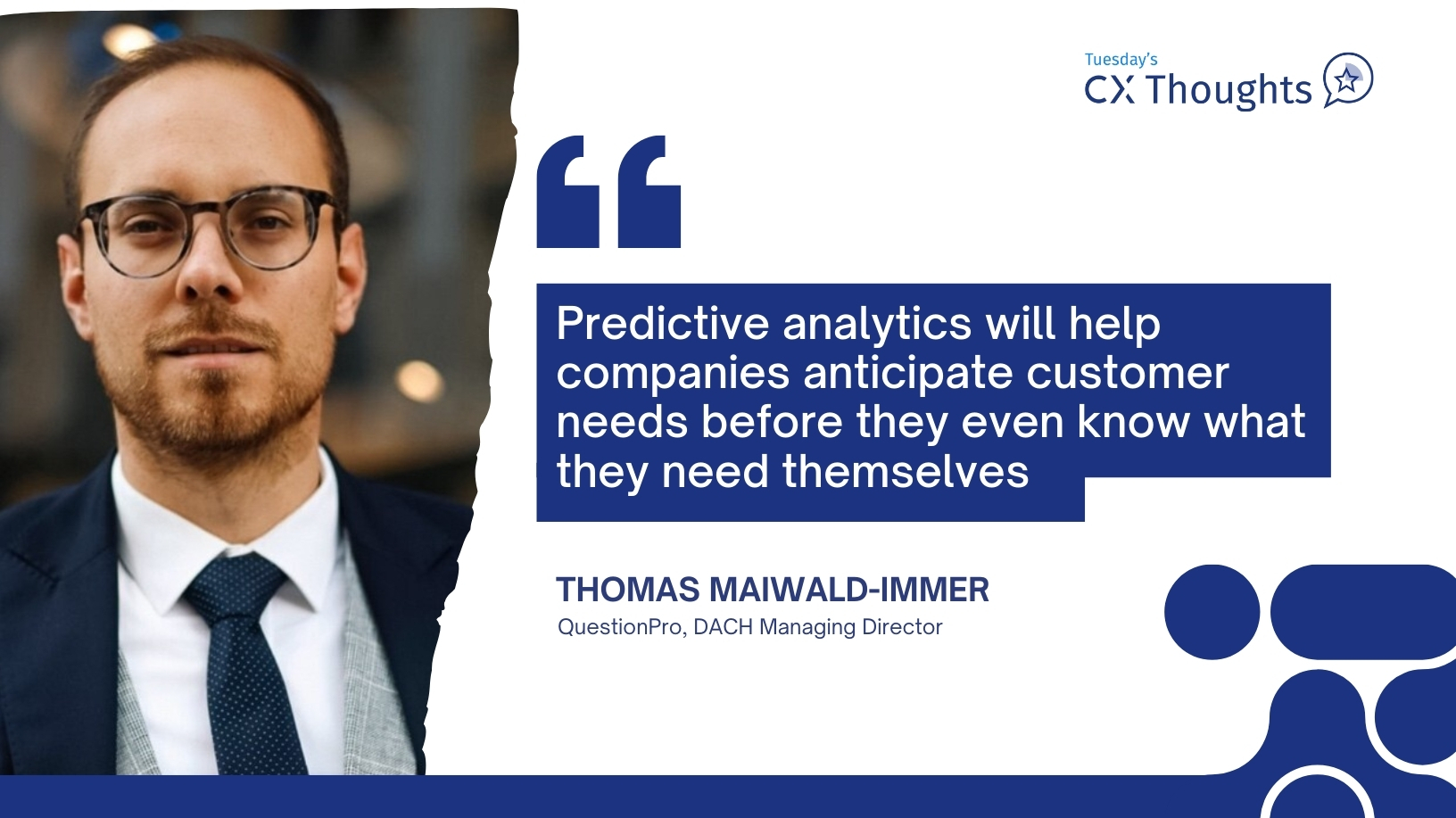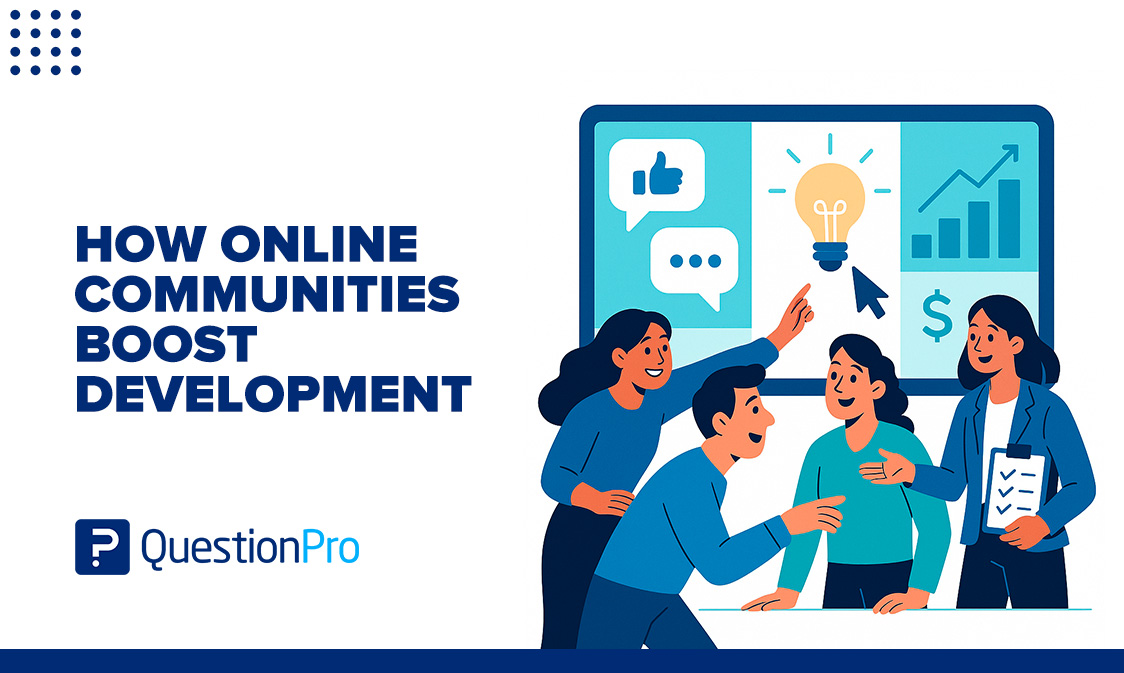
On April 3rd, we sponsored this year’s CX Research Days in Germany. The organizers interviewed our amazing DACH Managing Director Thomas Maiwald-Immer about how the company works in the CX field and how that work will evolve with the influence of AI.
| The original interview was published on March 13, 2025, here
Q. QuestionPro offers its clients services like market research surveys, employee surveys, and customer surveys (CX). How do the customer surveys work? What methods do you use, and why?
Thomas Maiwald-Immer:
Our CX surveys are methodologically flexible and adapt to the specific needs and CX maturity of our clients. We offer classic metrics like Net Promoter Score (NPS), Customer Satisfaction Score (CSAT), Customer Effort Score (CES), and our own enhancement of NPS (AskWhy), as well as advanced market research methods and emotional measurement tools.
We primarily see ourselves as a technology provider that equips companies to design their own VoC and CX programs. These are supported by in-depth open-ended feedback, AI-driven analytics, and continuous voice-of-customer programs that enable real-time feedback. A particular focus is placed on connecting this data with customer journey mapping, allowing feedback to be viewed in the context of the entire customer experience—not in isolation.
Q. How many people work in this area, and why is it so important to QuestionPro?
Thomas Maiwald-Immer:
Customer Experience is a core business area for QuestionPro, so we have a specialized team of CX experts, data analysts, and market researchers who work closely with our clients. Globally, several dozen people are involved in this area—from product development to consulting.
CX is important to us because it helps companies retain their customers long-term and create competitive advantages.
Our platform doesn’t just collect data—it also provides direct recommendations for action through AI-powered insights, which is incredibly valuable for companies.
Q. Looking back to the early days of CX, what did your work look like then, and how has it changed over time?
Thomas Maiwald-Immer:
In the past, Customer Experience was heavily reliant on traditional surveys—often one-off efforts without much integration into other parts of the business.
Today, CX is more data-driven, agile, and integrated.
Real-time feedback, predictive analytics, and automation now play a central role. A significant shift has also been the move from just measuring satisfaction to actively managing the customer experience:
Companies don’t just want to know how satisfied their customers are—they want to act immediately to improve it.
The perspective has also evolved. It’s no longer just about analyzing individual touchpoints in isolation but understanding and optimizing the full customer journey as a connected experience. Feedback can now be collected in more diverse ways than ever before: beyond traditional surveys, companies use videos, virtual assistants, and omnichannel solutions to get a more comprehensive and authentic picture of customer experiences.

Q. Looking ahead, how do you think CX work will continue to evolve?
Thomas Maiwald-Immer:
AI isn’t just a buzzword in the CX space—it’s a key driver of automation, personalization, and efficiency.
Predictive analytics will help companies anticipate customer needs even before customers are aware of them. Additionally, we’ll see a stronger focus on delivering a seamless, cross-channel customer journey—with smooth transitions between digital and human interactions.
Another trend is the deeper integration of CX into strategic business decisions:
Customer Experience will no longer be the responsibility of a single department, but embedded deeply into all business processes.
Q. What opportunities and risks come with AI?
Thomas Maiwald-Immer:
AI offers tremendous opportunities for CX: it can automate processes, enable real-time personalized experiences, and resolve customer issues more quickly. At the same time, there are risks—especially when AI is used without human oversight. Misinterpretation of feedback, impersonal interactions, or data privacy issues are challenges that companies must actively manage. It’s crucial not to see AI as a replacement for the human element but as a support system that enhances service without dehumanizing it.
Q. How much AI is too much for a good customer experience? Do you see limits? And do you think CX tools can strike the right balance between human interaction and automated service?
Thomas Maiwald-Immer:
CX tools must master the balancing act between automation and personal interaction. AI can efficiently handle repetitive queries, but wherever emotions, complex problems, or personalized service are involved, the handover to humans is essential.
Companies must be careful not to jeopardize customer loyalty through over-automation—a well-executed CX strategy uses AI where it provides true value.
Q. You’re sponsoring the CX Research Days on marktforschung.de. Why was it important to participate in this event?
Thomas Maiwald-Immer:
CX research is the foundation for making data-informed, customer-centric decisions. As a provider of one of the leading CX and research platforms, it’s important for us to support this dialogue and actively shape new developments in the industry.
The CX Research Days are an ideal platform to drive innovation and share best practices with experts and companies alike. We see it as our responsibility to share knowledge and help companies sustainably improve their customer experience.
To wrap it up…
Customer Experience is no longer just a metric—it’s a strategic imperative. As AI, predictive analytics, and real-time feedback redefine how businesses engage with customers, having the right tools and expertise becomes critical.
QuestionPro for Customer Experience empowers organizations to listen more deeply, act more intelligently, and create lasting relationships with their customers.






